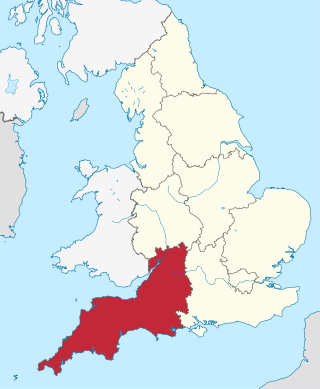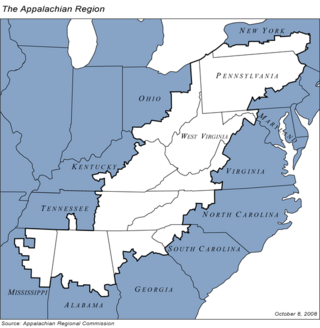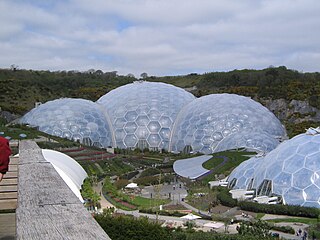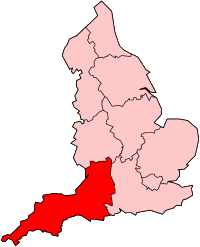
South West England, or the South West of England, is one of nine official regions of England. It consists of the counties of Bristol, Cornwall, Dorset, Devon, Gloucestershire, Somerset and Wiltshire. Cities and large towns in the region include Bath, Bristol, Bournemouth, Cheltenham, Exeter, Gloucester, Plymouth and Swindon. It is geographically the largest of the nine regions of England covering 9,200 square miles (23,800 km2), but the third-least populous, with approximately five million residents.

The West Country is a loosely defined area of South West England, usually taken to the counties of Cornwall, Devon, Dorset, Somerset and Bristol, and less commonly Wiltshire, Gloucestershire and Herefordshire. The West Country has a distinctive regional English dialect and accent, and is also home to the Cornish language.

The regional chambers of England were a group of indirectly elected regional bodies that were created by the provisions of the Regional Development Agencies Act 1998. There were eight regional chambers, one for each of the regions of England except Greater London, which had opted for an elected mayor and assembly in 1998. All eight regional chambers had adopted the title "regional assembly" or "assembly" as part of their name, though this was not an official status in law. The chambers were abolished over a two-year period between 31 March 2008 and 31 March 2010 and some of their functions were assumed by newly established local authority leaders' boards.
In Canada, the Regional Development Agencies (RDA) are the seven federal government agencies responsible for addressing key economic challenges and furthering economic development, diversification, and job creation specific to their respective regions.

In the United Kingdom, regional development agencies (RDAs) were nine non-departmental public bodies established for the purpose of development, primarily economic, of England's Government Office regions between 1998 and 2010. There was one RDA for each of the NUTS level 1 regions of England. Similar activities were carried out in Wales by the Welsh Government Department of Economy and Transport, in Northern Ireland by the Department of Enterprise, Trade and Investment and in Scotland by Scottish Enterprise and Highlands and Islands Enterprise.

The Appalachian Regional Commission (ARC) is a United States federal–state partnership that works with the people of Appalachia to create opportunities for self-sustaining economic development and improved quality of life. Congress established ARC to bring the region into socioeconomic parity with the rest of the nation.

The South West Regional Assembly (SWRA) was the regional chamber for South West England, established in 1999. It was wound up in December 2008. Its functions were taken on by the Strategic Leaders' Board, the executive arm of the newly established South West Councils.

Yorkshire Forward was the regional development agency (RDA) for the Yorkshire and the Humber region of the United Kingdom. It supported the development of business in the region by encouraging public and private investment in education, skills, environment and infrastructure. It was abolished on 31 March 2012 following the public spending review announced in 2010.

The economy of Cornwall in South West England, is largely dependent upon agriculture followed by tourism. Cornwall is one of the poorest areas in the United Kingdom with a GVA of 70.9% of the national average in 2015. and is one of four UK areas that qualified for poverty-related grants from the EU. Farming and food processing contributed £366 million to the county, equal to 5.3% of Cornwall’s total GVA. The agricultural/food industry in Cornwall employs 9,500 people, 23,700 are employed in the food industry in Cornwall The Cornish economy also depends heavily on its successful tourist industry which contributes 12% of Cornwall's GDP and supports about 1 in 5 jobs. Tourism contributed £1.85 billion to the Cornish economy in 2011.
The Wave Hub is a floating offshore wind and wave power research project. The project is developed approximately 10 miles (16 km) off Hayle, on the north coast of Cornwall, United Kingdom. The hub was installed on the seabed in September 2010, and is a 'socket' sitting on the seabed for wave energy converters to be plugged into. It will have connections to it from arrays of up to four kinds of wave energy converter. A cable from the hub to main land will take electrical power from the devices to the electric grid. The total capacity of the hub will be 20 MWe. The estimated cost of the project is £28 million.
The South West Film Studios were built in 2002 at St Agnes in Cornwall, England, United Kingdom, and soon become known locally as "Aggiewood". Costing £5.7m to construct in total, the complex was one of the highest-profile Cornish projects backed by European Objective One funding, receiving nearly £2 million while the rest of the money came from the private sector. It was the first purpose-built film studio to be built in the UK since 1923 and was the region's first film studio complex. The studios were due to have state-of-the-art production facilities for the film and television industry and was constructed on a 10-acre (40,000 m2) site which was a former leisure park and model village site in St Agnes. It had been expected that the studios would create 200 permanent jobs when they opened for business and pour millions of pounds into the local economy as it had the full backing of the South West Regional Assembly and the South West Regional Development Agency.
Devonwall was a political concept introduced in the United Kingdom in the 1970s by the Conservative government. It was an attempt to link Cornwall and Devon together in an economic, political and statistical sense to form a South West region. This involved combining and centralising some local government functions and services such as the police, ambulance, fire services and media output such as local TV and newspapers.
The Northwest Regional Development Agency (NWDA) was the regional development agency for the North West England region and was a non-departmental public body. It was abolished on 31 March 2012.

Advantage West Midlands was established in 1999 as one of nine regional development agencies (RDAs) in England. RDAs were created by the UK Government to drive sustainable economic development and social and physical regeneration through a business-led approach. Operating at arm's length from government, RDAs had business-led Boards that were appointed by the Secretary of State for Business, Innovation and Skills. Advantage West Midlands was closed on 31 March 2012 as part of the wider closure of the RDA network.
The North of England Inward Investment Agency is a UK government sponsored agency that represents two regional development agencies (RDAs) in North England: Northwest Regional Development Agency (NWDA), One NorthEast (ONE) and Yorkshire Forward (YF). NoE’s primary function is to work as an ambassador to businesses and therefore attract targeted inward investment to the North of England region.
The South West Observatory (SWO) was a regional resource for the South West of England, originally established by the former South West Regional Development Agency, Government Office for the South West, and the South West Regional Assembly as a partnership for use by policy-makers to aid and improve evidence-based decision-making. It operated from 2002 - 2013.
The Duchy College Rural Business School was founded in 2006. It is part of the Cornwall College Group and its main purpose is to provide a range of services that meet the needs of rural communities, including training opportunities, business support and an ongoing research programme. Richard Soffe is Director of the Rural Business School.
Sir Henry "Harry" William Studholme, 3rd Baronet, is a British forester, businessman and landowner. He is the chairman of the U.K. Forestry Commission, which manages the U.K.'s state-owned forests and is the country's largest land manager. He ran the U.K. government's Regional Development Agency 2009 – 2012.

Heart West is a regional radio station owned and operated by Global as part of the Heart network. It broadcasts in South West England, South Wales, Herefordshire, Malvern and Malvern Hills from studios in Bristol.
Nick Hounsfield is a British surfer, social entrepreneur, founder and chief visionary officer of The Wave, the first inland surfing destination in Bristol. Hounsfield has a particular interest in surfing and ‘blue health’, adaptive and para surfing, and policy-shaping and development. He is a member of the UK Sport International Leadership Programme and as a Director of Surfing England oversees surfing’s first funding from UK Sport.










